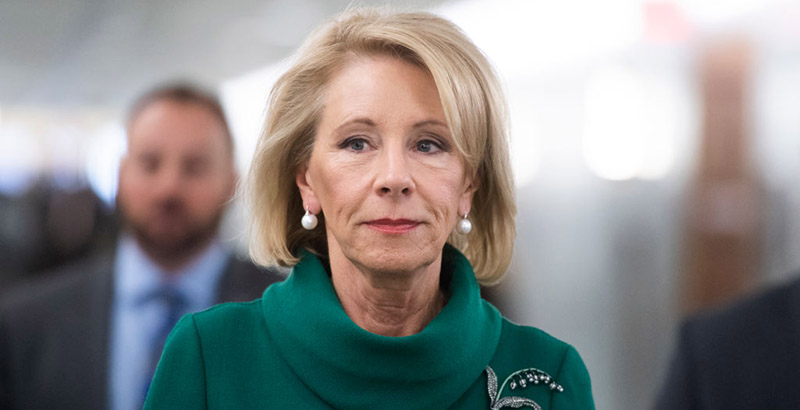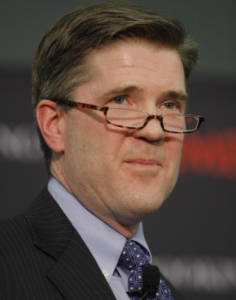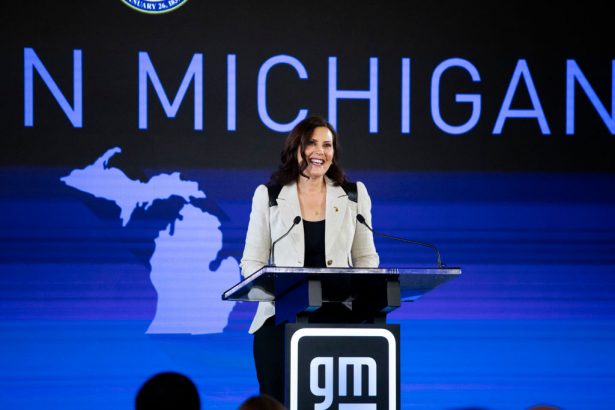In Her Home State of Michigan, Betsy DeVos is Closer than Ever to Realizing Her Dream of Private School Choice

Get stories like this delivered straight to your inbox. Sign up for The 74 Newsletter
Michigan’s years-long debate over private school choice is heating up again this year. And experts say that backers of a voucher-like system, led by former U.S. Education Secretary Betsy DeVos, may have at last found the means to direct public funds to private schools.
More than two decades after Michigan voters resoundingly rejected vouchers at the ballot box in 2000, DeVos and her allies are attempting to pass a new school choice law through an unusual wrinkle in the state’s ballot initiative process. The public campaign, known as Let MI Kids Learn, would award tax credits to private donors who contribute to newly created scholarship funds; those scholarships could be accessed by families to pay for their educational expenses, including private school tuition.
The shift in policy would be “substantial,” said Ben DeGrow, director of education policy at Michigan’s right-leaning Mackinac Center.
“Michigan would be going from basically zero private school choice to a robust choice program very quickly,” DeGrow said. The new benefit would somewhat resemble similar tax credits offered in 22 other states, many initiated or revised over the last decade, he added.

Its path to enactment, however, sets it apart. After two tax-credit bills were vetoed last fall by Democratic Gov. Gretchen Whitmer, conservatives pursued a different strategy to realize their aims. Now, if the organizers of Let MI Kids Learn collect a relatively small number of signatures by June 1, the proposal can be passed again by both houses of the Republican-held state legislature. After that, the law cannot be vetoed again by the governor, who is running for re-election later in the year.
Few other states permit such a process, which combines a direct appeal to the electorate with the strong-arm tactics of the statehouse. If local Republicans prevail, their blueprint for success will be one that lawmakers elsewhere won’t be able to follow. But they will have significantly advanced the aims of the DeVos family, which has long sought to bring private and religious schools under the umbrella of K-12 options supported by their home state.
John Austin, a senior fellow at the Brookings Institution and the former Democratic president of the Michigan State Board of Education, described the state’s generational fight over schools as a “20-year shooting war” that led to this push.
“All these battles over privatizing schools have eviscerated the public education establishment of administrators, personnel, and their influence,” Austin said. “It’s a very different politics than 20 years ago, and it’s carried the day because of the aggressive efforts of the DeVoses and their allies.”
‘A perfect deal for the DeVoses’
Michigan is perhaps America’s most wide-open environment for public school choice. A huge charter school sector enrolls about 150,000 K-12 students, and even among families who stick with traditional public schools, many take advantage of the popular Schools of Choice initiative, which allows students to attend schools outside their own district.
But like most states, Michigan disallows private schools from receiving public money. That prohibition was added to the state constitution after a referendum in 1970 and loudly reaffirmed in 2000, when the electorate voted down a ballot measure to lift the ban. The DeVos family contributed heavily to that later effort, which failed by a 39-point margin.
In the intervening years, Republicans have labored to widen the available alternatives to district schools, lifting a cap on charters in 2011 and dramatically increasing the enrollment of virtual charters the following year. They’ve also opened subtle cracks in the wall separating the public and private sectors by allocating millions of dollars to reimburse private schools for costs associated with state-mandated expenses like fire drills and inspections.
However, the party didn’t reopen the question of directing state funding to pay for private school costs until late 2021, when GOP majorities in the state House and Senate approved legislation creating “opportunity scholarships” that would be available to qualified families; eligibility was tied to household income, which could be as high as roughly $98,000 for a family of four. Beneficiaries could receive nearly $8,000 to pay for private tuition, but the bills also offered hundreds of dollars to public school students to spend on tutoring, books, and other supplemental learning costs.
David Arsen, a professor of education policy at Michigan State University and sometime critic of the DeVos family, said that the structure of the tax credits was “almost nicer” than the straightforward voucher design that was unsuccessfully put before voters.
“It’s sort of a perfect deal for the DeVoses,” Arsen reasoned. “The money they formerly would have given to the state, they will now be able to give to the private school vouchers of their choice.”
Austin said the push was directly related to the COVID-19 pandemic, when some Michigan districts kept schools closed for months. An analysis from researchers at the University of Michigan found that public school enrollment in the state dropped by 3 percent in the fall of 2020 (enrollment among kindergartners dropped by 10 percent), while homeschooling and private school attendance simultaneously climbed. In other states, too, parents began to embrace specialized “education savings accounts” to offset new expenses incurred after withdrawing their students from traditional schools.

“Some of the parents I know just found other schools that had stayed open, including private ones,” Austin said. “So the political moment is right for arguments about parental rights and parental choice governing kids’ education.”
A request for comment from the DeVos Family Foundation was directed to Let MI Kids Learn spokesman Fred Wszolek, who agreed that by underwriting private school tuition or instructional expenses such as curricular materials, the new policy could give parents “leverage they didn’t have before.”
“They can go to their school board meeting and say, ‘Hey, why are you teaching this subject this way? We think it should be different,’” Wszolek said. “And now everybody will have the potential to take their kids and go [to private school] or homeschool their kids. So the education establishment — the teachers’ union, the school boards, and the school superintendents — they’re all going to have to get used to the fact that change is coming.”
Unusual legislative maneuver
Even before Gov. Whitmer vetoed the two bills last November, having previously called them “nonstarters,” school choice advocates announced that they would launch a petition drive in support of the tax-credit scholarships. Within a few weeks, their petitions were approved, giving the organizers six months to collect a little over 340,000 signatures from Michigan voters.
Gathering the necessary signatures would allow the legislature to vote again on the tax credits within a span of 40 days, in accordance with the Michigan Constitution’s “indirect initiative” provision. If they vote in favor, the proposal will be enacted — and Whitmer cannot veto it.

The indirect initiative grants tremendous power to legislative majorities in Lansing, though they have seldom exploited it. Due in part to favorably drawn district boundaries, Republicans have made up a majority of the state House for 22 of the last 28 years; they have held the Senate continuously since 1984.
This year, frustrated by Whitmer’s active veto pen, the GOP is pursuing indirect initiatives related not only to tax-credit scholarships, but also voter ID requirements and pandemic-inspired emergency orders. Lou Glazer, a longtime observer of local politics and head of the nonprofit Michigan Future Inc., said that while the tool had always been available to politicians, its previously infrequent use made it feel like “a brand-new tactic.”
“What’s changed is the willingness to use this device, which has been there for a while,” Glazer said. “As long as you control the legislature — the governor is irrelevant — you can initiate and enact policy with very few signatures.”
In fact, the signature threshold of 340,047 represents just 8 percent of the votes cast in the 2018 gubernatorial election, in which nearly 2.3 million voters supported Whitmer. Sources agreed that the mark would be easy to hit, especially given the extensive resources of its proponents. State financial reports show that members of the DeVos family have already donated over $400,000 to Let MI Kids Learn, which will help underwrite a highly organized corps of professional signature collectors. The Great Lakes Education Project, an advocacy group established by DeVos, has kicked in another $25,000.
Provided the petitions win the requisite support, the question becomes whether the legislature will go along with the process. Michigan State’s Arsen argued that the support of Republican lawmakers was “not a slam dunk,” even though they passed the original legislation last year. Many represent school districts that have faced shrinking enrollment and financial distress for years, and the notion of propping up private schools out of the state’s coffers — particularly through such an unorthodox legislative avenue — might give them pause.

At the same time, he added, the DeVos political machine can be expected to keep wrangling votes in favor of their top agenda item. In past struggles over education policy and governance, the family has proven more than willing to finance primary challenges against Republicans who stray from the preferred line.
“If this initiative gets the signatures and goes before the legislature, everybody knows that the DeVoses will be putting on a full-court press,” Arsen said. “They’ll use their resources to the extent possible, and there’s usually not a lot of wiggle room for legislators to step outside that influence. They know they’ll be primaried if they do.”
Looking toward election
The Mackinac Center’s Degrow said that Michigan Republicans would require little arm-twisting to repeat their votes in favor of the opportunity scholarships. The ongoing groundswell in favor of greater family involvement in education — typified by Virginia’s gubernatorial election last November, in which Glenn Youngkin rode to victory on a wave of parental discontent — amplified the political case for the policy.
“They’ve already publicly committed themselves on this issue, and the timing of the governor’s veto of the bill coincided with the parent uprising election in Virginia,” Degrow argued. “That may have reinforced in their minds that there’s a political advantage in recognizing the wishes of parents.”
Let MI Kids Learn’s Wszolek said he believed the proposal would become law in 2022, and that its detractors would struggle to dismantle the choice scheme in the future.
“If the teachers’ union wants to take it to the ballot in 2024 to try to repeal it, they’re free to do so,” he said. “But I don’t think they’re going to be successful because once people see that options are a great idea, they’re not going to want to do away with them.”
Whatever popular support the scholarships might gain if enacted, severely diminished labor strength could help them survive future elections. Since Michigan became a right-to-work state in 2012, membership in its largest teachers’ union, the Michigan Education Association, has plummeted by one-third. Additionally, nearly 7,000 member accounts have been sent to collections because of non-payment of union dues.
For the moment, most of the state’s political class is already looking toward Election Day 2022, when every seat in the legislature will be up for grabs. Republicans are favored to hold onto both chambers, especially in a midterm cycle when voter sentiment seems to be trending away from the Democrats. But a revised set of district maps designed by the state’s newly nonpartisan redistricting commission could make this fall’s races more competitive than they’ve been in years. If the tax-credit initiative proves controversial with voters, that shift in political circumstance could prove an obstacle.
Gov. Whitmer, who became a national figure during the pandemic, is also running for a second term this year. The field of Republican challengers has yet to fully take shape, though polling in the race’s early stages shows the incumbent narrowly leading former Detroit police chief James Craig. K-12 issues could offer an opportunity to widen the gap.
A request for comment from the governor’s office was not returned. Already, however, Whitmer has unveiled a 2022 budget request that includes the largest increase in education funding in two decades. The proposal, drawing both from federal COVID relief and projected state surpluses, would offer school employees substantial annual bonuses over the next five years, along with a 5 percent increase in overall per-pupil support.
Arsen said that in a career of studying education finance in the state, he’d never seen such an ambitious plan to increase school spending. He added that the move might carry particular benefits in areas of the state that have long been economically depressed, and where school districts are some of the largest employers.
“Rural Michigan is not enjoying the economic dynamism — such as it is — of the rest of the state. And it’s not unlike parts of Wisconsin or Pennsylvania: They’re all red, but the superintendents are like the mayors in these towns. Whitmer understands this. She’s got to have something to say to rural Michigan, and she’s leading with schools.”
Get stories like these delivered straight to your inbox. Sign up for The 74 Newsletter

;)
